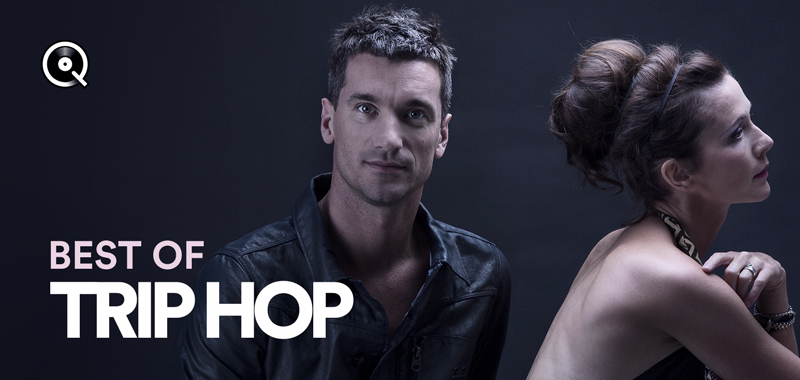Massive Attack – Blue Lines (1991)
Whether or not it announced the actual birth of trip hop, the certainty is that Blue Lines sounded unlike anything else on the music scene when it was released in April ‘91. Slinking sinuously between smoky breakbeats, cutting-edge samples (Billy Cobham, Tom Scott, Lowrell Simon, Wally Badarou…) and anaesthetized rap, the debut album by Massive Attack bridges soul, reggae, dub, rock, electronica and cold wave. The sultry, stunning sound slipping out of Bristol was the brainstorm of a trio – Robert Del Naja (3D), Grant Marshall (Daddy G) and Andrew Vowles (Mushroom) – of musical shapeshifters, fusing evanescent soundscapes, chloroformed grooves and melancholy, meditative ambience. It’s a musical dreamscape orgy partly inherited from the sound they’d developed during the previous decade with the Wild Bunch collective (with Nellee Hooper, producer of Björk and Madonna, among others). To lay down Blue Lines, Massive Attack called in Tricky, loonie former acolyte of the Wild Bunch, and eclectic voices including Jamaica’s Horace Andy and soul sister Shara Nelson. She owns Unfinished Sympathy, the massive single borne on the wings of Hollywood strings and a video (single-shot sequence on the streets of L.A.) that branded the identity of the group going forward. Blue Lines also features Neneh Cherry, muse, godmother and shake-mistress of the trio and album, as well as a cover of Be Thankful for What You Got by the William DeVaughn, a 1974 soul hit renamed Be Thankful for What You've Got… From the get-go, 3D, Daddy G and Mushroom were not content to be sonic gold-diggers. They fully digested their disparate influences to invent the soundtrack of a dark and seedy era whose children were nonetheless determined to stay on the dancefloor.
Portishead – Dummy (1994)
Three years after the Massive Attack debut, the focus shifts 15 miles west of Bristol, to the coastal town of Portishead and another trio, this one consisting of boys and a girl: Geoff Barrow mans the machines, Adrian Utley on guitar, framing the haunting voice of shy Beth Gibbons (think Tracey Thorn, Sade and Stina Nordenstam). While their first album features all the signifiers of trip hop (hip-hop beats, dub languor, austere ambience…), it especially resembles the soundtrack of an imaginary film noir, an effect heightened by the legendary sample of Danube Incident, an old theme by Lalo Schifrin for More Mission: Impossible, used in Sour Times. Less oppressive than Massive Attack, the sound of Dummy is still elementally melancholy, even balancing on the very precipice of despair, a kind of gorgeous ennui with a viscerally bluesy soul. Occasionally anxiety-provoking, like some unknown score by Morricone, the listener has the sensation of leaning on the counter of a dark, deserted lounge bar, while in the shadows, Beth Gibbons plays Peggy Lee at the end of the world…
Tricky – Maxinquaye (1995)
A free spirit in the Wild Bunch collective and co-founding member of Massive Attack, Adrian Thaws alias Tricky launched his solo career 4 years after fans discovered his raspy voice on Blue Lines by the Bristol trio. From his very first EPs in ‘92, we recognized this bad boy was swarming with ideas beyond the smoky grooves of the trip hop scene. And Maxinquaye is the freaky MRI of his molten brain. Conceived with Martina Topley-Bird, a muse with a sensual voice, the album blends Massive Attack-style soul, sick dub, avant-garde hip-hop, glacial cold wave and electronica soundscapes. A huge rap fan (he worshipped Rakim), Tricky even revisits Black Steel in the Hour of Chaos by Public Enemy with his own well-crafted metalloid version. He samples Isaac Hayes alongside the Smashing Pumpkins, Marvin Gaye, KRS-One, LL Cool J, the Chantels and Michael Jackson, laying down his own very innovative, kaleidoscopic soundtrack. This is groove in its terminal phase, scarred and scratched but newly fascinating with each and every listen…
Nightmares On Wax – Smokers Delight(1995)
Sixteen years after Rapper’s Delight by Sugarhill Gang, George Evelyn – alias Nightmares On Wax – responded with his aptly entitled Smokers Delight. Let’s just say this second album from the DJ and producer from Leeds is… smokin’. No matter how much he trumpeted his disdain for the “trip hop” designation, this Brit cooked up the most remarkable fusion of dub, soul, jazz, funk, downtempo, ambient and rap of the ‘90s, the most impressive collage of everything that makes the genre great… Folding his samples (Bob James, Quincy Jones, The Dells, Barry White, Positive Force, Lonnie Smith…) and vintage keyboards in shamanic, tribal and/or funky rhythms, NOW adorns his musical head-trip with an unprecedented sense of apathy and sophistication. Just ease back and be transported by this magnificent instrumental patchwork.
Kruder & Dorfmeister – DJ-Kicks (1996)
Nope, not Bristol, not London, nor any other British town. This mix from the DJ-Kicks series is 100% Austrian. This mostly downtempo orgy is helmed by Peter Kruder and Richard Dorfmeister, two Viennese cats who transform dub into a magnificent lounge symphony for kids from upscale neighbourhoods. The two DJs mix and re-mix up trip hop by Herbaliser and reggae lounge by Thievery Corporation, along with Stefan Hantel alias Shantel, the neo-dub of Statik Sound System and drum'n'bass of Aquasky. Beyond name dropping for experts, this is climactic, cinematic material against a backdrop of velvety beats, sculpted into single, singular compositions… Two years later, Kruder & Dorfmeister would deliver another classic of the genre, The K&D Sessions, featuring a fabulous remix of Heroes by Roni Size. Solo, each brings a more personal approach to the genre: Dorfmeister with his group Tosca (the album Opera opens with the emphatically self-evident Fuck Dub Part 1 & 2) and Kruder with his Peace Orchestra project.
Create a free account to keep reading












